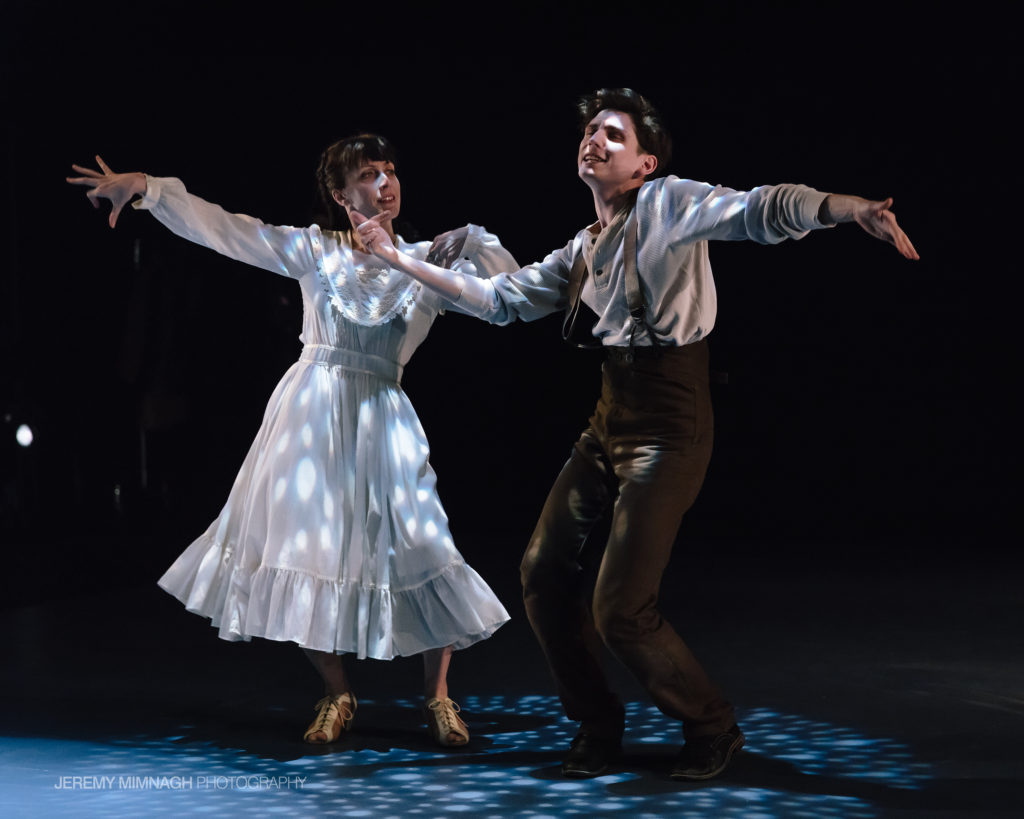 Toronto’s Theatre Rusticle incorporates movement into Thornton Wilder’s play Our Town
Toronto’s Theatre Rusticle incorporates movement into Thornton Wilder’s play Our Town
Theatre Rusticle productions are sparse and anticipated by those in the know. They focus on physical theatre, and I was eager to review their production of Thornton Wilder’s Our Town, which is currently playing at Buddies in Bad Times Theatre until April 2nd.
I’m not a die-hard fan of Our Town, which is funny because I directed it in my last year of university. I was curious to see what Theatre Rusticle would do with it because I know it can be a divisive show. The first and second acts are purposefully slow, watching small town folk live their “dull” lives. But the third explains why those acts were important so poignantly that hopefully you’ll forgive the play so long as everything has been done reasonably well. And this production does it very, very well.
A criticism I often heard it is that the Our Town is too “traditional” but I’ve always disagreed with that. On the surface, it seems to be touting the traditional values of small town folk in rural turn-of-the-century America, but beneath that there’s some much deeper exploration.
Moreover, Our Town was a very different show for it’s time. By today’s standards I wouldn’t call it progressive, but I give it credit for questioning things like the role of women, traditional gender roles, sexuality and suicide. It asks existential questions without completely tying itself to any particular religious framework.
I always thought how neat it would be, given more time and resources, to experiment with Our Town. And Theatre Rusticle’s production is very much the realization of those fancies. This production sees the room for creative expression in Wilder’s classic and is going out on a literal limb to take it to new places.
Rusticle’s focus on movement is fascinating to see in this play because it brings in a new way for characters to express themselves. Like I said, there’s a great deal of subtext in this script and the company’s approach expresses this very well. When Mrs. Gibbs tells us it’s her life’s dream to visit Paris but she can’t because her husband won’t let her, the repression of her early 20th century small town life isn’t just implied through intonation, we see it in the way she contorts herself onstage.
And that to me is what’s so beautiful about Rusticle’s take on the show. The physicality of this production elevates the subtleties of the text. The actors run and dance along the stage, throwing in the sounds of chickens and trains. Sometimes I felt that these bits missed the mark, but most of the time they manage it.
There were still things that didn’t quite work, but they took a backseat for the most part. For instance, the core of Matthew Finlan’s performance as George was fantastic; with just the right amount of boyish charm. That said, my guest and I both agreed that his movement as George was a little over the top, and it was frustrating that it didn’t evolve enough as the character matured. There was some similarly confusing direction at other moments throughout the show, but my friend and I both agreed that the positives far outshone the few things that peeved us.
The decision to split up the role of the Stage Manager (i.e. narrator) among the cast felt very natural. It was ingenious really, helping to give the production more of an ensemble feel while improving the folksy vibe the role brings to the show.
Overall, I was really impressed by the actors. Hume Baugh breathes a certain warmth into his role as Mr. Webb that I didn’t expect to see from that character. Priscilla Taylor played Emily with a delicate subtlety such that her final monologue was effectively quiet and poignant. The standout to both my guest and myself had to be Jenna-Lee Hyde as Mrs. Gibbs. She opens the show, taking the first of the Stage Manager’s lines; like Baugh she has this incredible warmth and comfort onstage.
The first act was slightly jarring, with some of the movement work and lighting not quite coming together until about half way through. The second act was great, and the third was close to being perfect. The lighting, the costumes, and the movement with the rotation of Jupiter playing in the background.
The ending of Our Town is heartbreaking, but this production didn’t bring me to tears as it usually does. Maybe it’s just because I’ve seen the show so many times, but instead of crying I felt a strange sense of wonder: melancholic but also touched by the cosmic beauty Theatre Rusticle managed to convey.
If you’ve never seen Our Town performed, this is a great introduction to it. And if you have, even if you weren’t crazy about it, I’d recommend giving this production a chance to change your mind.
Details:
- Our Town is playing at Buddies in Bad Times Theatre (12 Alexander St) until April 2, 2017
- Shows are at 8:00 PM
- Tickets are $28 general admission
- Run time is approximately 1h 40 min, with no intermission
- Some audience participation
Image of Lucy Rupert and Michael Finlan by Jeremy Mimnagh.
